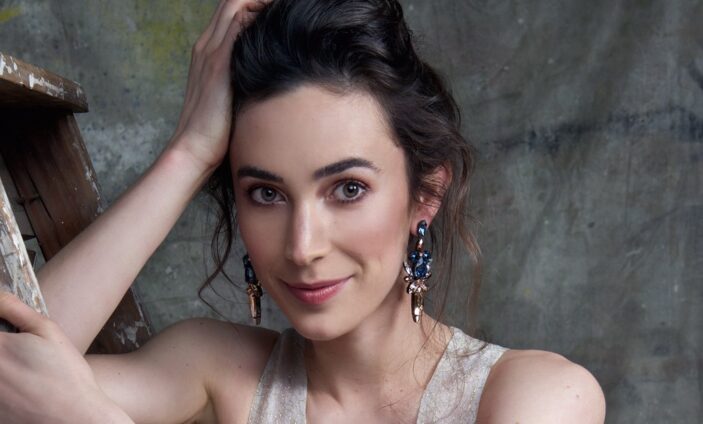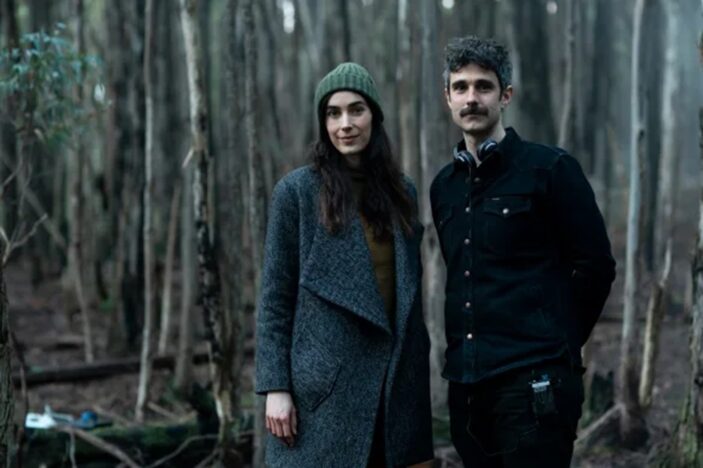
When the body of his oldest friend is found buried in a shallow grave, Dan, a small-town cop, seeks answers from a volatile Hermit who may have been the last person to see his friend alive.
Such is the plotline for Mark Leonard Winter’s intimate, psychological drama The Rooster, which is arriving in Australian theatres this week, following a successful run at both the Melbourne International Film Festival last year and, most recently, the Santa Barbara Film Festival.
Gearing up for her own run on the stage for her role in the Queensland Theatre production of Gaslight, The Rooster’s producer Geraldine Hakewill spoke to Peter Gray about assembling the film on a limited budget, the conversation around fragile masculinity the film has created thus far, and if she managed a work-life balance working alongside her director husband.
Before I get to The Rooster, I want to say congratulations on Disclosure. That was such an unexpected film. I loved how uncomfortable it was, and all the performances were amazing.
Thank you, that’s so lovely. It was a really beautiful film to make. I really like it, as well, and I love how uncomfortable it is. Yeah, I felt like we all did really beautiful work, and it’s that thing were you make something like that and there’s two people in the whole world that see it (laughs), but it was a really nice thing to do all together. Making that film, I think was a bit of a springboard for Mark and I to go and see what was possible in us making something too. What we ended up doing was an even smaller undertaking, but it’s still a similar sort of model in terms of filming in essentially one location, with as small a team as possible. (Disclosure) was a tiny, tiny, micro budget film, but it was a really special one.
I know The Rooster premiered at the Melbourne International Film Festival last year, and you’re now screening at the Santa Barbara Film Festival, will this be the first international reaction to the film? It’s always difficult to gage how international audiences will respond to an Australian film.
Yeah, this will be the first one. I think it will be interesting to see what sort of reaction (the film gets), because I feel like it’s speaking to something that we are starting to talk about more in our culture in terms of masculine vulnerability, and depression, and suicide, but I’m not sure how prevalent that is. Internationally, I know the problems are the same, but I’m not across whether it’s something that in the cultural consciousness as much as its become here. I think that will be interesting. The performances are amazing, and I think the story is entertaining enough, even if it’s confronting. I’m hoping there’s still an appreciation for the art behind it.
Even though it is a very Australian film, I think, as you said, it has that universal theme to it. I think that makes the language more accessible. Is anything that we see now different from what was originally envisioned for the film originally?
It evolved so much. I think that was partly because of Mark’s career as a theatre maker, and his ability to feel what’s working as a dramaturg, and his ability to throw things out. We went through so many different drafts, as well as compiling notes and getting feedback from different industry people. He’d come back with the most incredible stories that really took (The Rooster) in a very different direction. What it ended up being was something quite close to what we had initially. It just went through a big transformation along the way that also revealed things that ended up in the film that were really important. It was a really exciting process because (Mark) was so open to following the thread of what needed to happen. The one thing that remained throughout though was Hugo’s character. I think that was a real grounding point for the story. Mark wrote it for Hugo, and I knew very early on that he wanted to write something for him and work with him.
I think (Hugo) was the second person to come on board, after me, and he read many, many drafts and was always complimentary and supportive throughout the whole process. But he was that character, and he remained quite similar to what you see. A lot of his dialogue and thought process were in those early drafts. And there were always animals in the film. I’m not sure if the rooster was there in the first draft, but it was something that existed for a long time, and part of the inspiration for the film was because we had this very aggressive rooster on our property when we first moved in. It would attack us every time we went to feed it. Then Mark started exploring the themes of the film, and that felt like a really good metaphor for a particular type of masculinity.

It’s always so great when a film comes from a really personal space, and I think regarding views on masculinity, that was something that definitely shifted during the pandemic. I appreciated that The Rooster isn’t beating us over the head with its message either. It’s addressing issues in an entertaining manner. Even if you feel almost uncomfortable in laughing at such.
Yeah, Mark talks a lot about the absurdity of being in a depressive state and futile and frustrating it is, but also just how ridiculous everything feels. As much as we might be in a state of turmoil, I think, as human beings, we always have the ability to see the absurd. It’s really important to, and it’s another way of finding connection as well.
How collaborative was Hugo when it came to his character’s dialogue? He obviously saw the character changing over each draft, so did he have a lot of input? Or he very much left it in Mark’s hands?
He was very collaborative, yeah. Every single word was scripted (though). We were talking about this the other day, just how impressive that is for an actor to make something that verbose feel improvised. But I also thinks it speaks to Mark having worked with Hugo multiple times. I think this is their fourth film together, but the first as actor and director, but they’ve worked together a lot and have been friends for a while. I think Mark was able to tap into that quality that Hugo has that lent itself to the hermit’s (his character’s) voice. But, similarly, Hugo tapped into the part of Mark where the hermit came from. I think their relationship really formed how lived in that character feels.
It was really magical watching (Hugo) on set, because he brings so much work to everything he does. He was doing us a favour, really, by being in this film. He’s the reason we were able to get this film made, essentially. He’s the name that brought everybody to the project. But he treated it like any other film he’s made. He knew it was going to be a challenge, but he’s the sweetest, loveliest, most generous, artistic, refined human being, and he knew what kind of leap he had to make into this character. As a producer, it was a joy to be able to watch him work. He really elevated everybody else’s work.
And you’re the producer on this. Does being an actor yourself help in that position, as you know how it is to be on the other side of it?
In some ways, yes. I’m not sure if it makes it easier, but I think it does mean that I have an awareness of perhaps some things that cast and crew might want or need that maybe other producers would think of straightaway. We had a great team, myself and Mahveen Shahraki. She’s very experienced as a producer, she’s amazing with a spreadsheet and a budget (laughs). She also has this ability to take care of people and really understand (them), but I think having both of us come these different sides of producing was really helpful. We worked well together to make it quite a holistic experience. Everyone from the cast and crew are still talking to us (laughs), so that’s always (nice). When you’re making a low budget film in the middle of winter in one of the coldest parts of Australia…the fact that everyone had a pretty good time was one of the nicest things to come out of it.
With you and Mark having both that personal and professional relationship, were you able to keep those positions and emotions separate when making the film?
Oh, it’s impossible! (Laughs) Impossible. I think in some ways it was great, because we could get a lot done. We couldn’t ever really stop talking about it. There were quite a few times where one of us, I think mostly me, would say, “Okay, we need to separate this somehow. From 8pm we’re not going to talk about work anymore.” Inevitably, things would pop into your mind when you’re making dinner or watching TV. You’d watch a movie and then go off on this long tangent about how we could achieve this particular shot or use this location. You’d just start constantly scanning your environment for anything that might help you achieve this enormous mountain of making a feature film, so we never really were able to switch off.
But I think that’s good because it meant we could achieve (the film) in quite a reasonably short amount of time. I think, overall, it took us about two and a half years to make this from go to whoa. And in the scheme of making a film, that’s not really a long time. I mean, I was still sending e-mails two days after our son was born, and people were like, “What are you doing?!?” I mean, I was just sitting in bed, but things are still happening. The score is being recorded, and I needed to help find a soprano for the part (laughs), so I think we learned a lot about work/life balance and how we’re not very good at it (laughs).
The Rooster is screening in Australian theatres from February 22nd, 2024.
